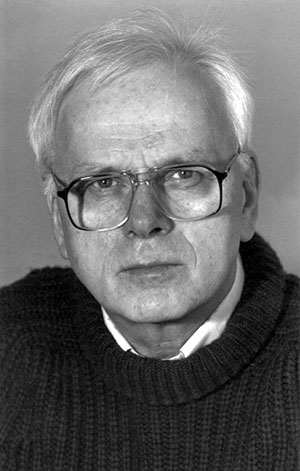In Memory of Kristen Nygaard (1926-2002)

The first time I met Kristen was at the University of Tromsø sometimes early in the 1980ies. In those days I was into AI, and my pet project was human speech synthesis by computer. I had given just given a public lecture about the marvels of speech synthesis technology when a booming voice could be heard from the back row of the lecture theatre: “Thou shalt not make unto thee a computer in the likeness of man!” That was Kristen Nygaard.
What followed was a long and interesting discussion that started in the lecture theatre and ended in one of Tromsø's livelier nightspots well over midnight. During that evening, we discussed computers, politics, science, life, the universe, and everything. It changed both my view on computers and informatics and the direction of my research.
Later, Kristen and his wife Johanna became good friends. We have shared many a jug of Riesling, excellent meals, and late hours of stimulating conversation at Kristen and Johanna's home. Kristen was a man who knew how to appreciate a jug of Riesling, an excellent meal and good conversation.
Kristen died from a heart attack on August 10th, 2002. He was spending the weekend at his family's holiday home at Tjøme.
He was born on Aug. 27, 1926 in Oslo, Norway. His master's thesis (1956) in mathematics at the University of Oslo was on abstract probability theory and specifically on the theoretical aspects of Monte Carlo methods.
From 1948 to 1960, Kristen Nygaard worked at the Norwegian Defence Research Establishment in computing and programming and operational research.
In 1960 he was employed by the Norwegian Computing Centre, becoming its Director of Research in 1962, responsible for building up the NCC as a research institute.
Together with Ole-Johan Dahl he developed SIMULA I and SIMULA 67 - the first objected oriented programming languages. They introduced the major concepts upon which all later object-oriented programming languages are built: Objects, classes, inheritance, virtual quantities and multi-threaded program execution (1961-67).
He then started to work with Norwegian trade unions on issues such as planning, control, and electronic data processing. This action based research on the social impact of computer technology resulted in a radical change in how the trade union movement perceived such technology, and also produced the general system description language DELTA (1968-1975).
Since 1976, he has worked with Ole Lehrmann Madsen and a number of others on the development and implementation of the new object oriented language BETA. His latest project, which got funding just before his untimely demise, was COOL (Comprehensive Object-Oriented Learning), an international project to introduce object-oriented methods in education.
Kristen Nygaard was professor in Aarhus, Denmark (1975-1976) and then became professor in Oslo (1977-1996).
In June 1990 he was promoted to Doctor Honoris Causa at Lund University, Sweden, and in June 1991 he became the first Doctor Honoris Causa to be promoted at Aalborg University, Denmark. In October 1990 the American association Computer Professionals for Social Responsibility awarded him its Norbert Wiener Prize for responsibility in social and professional work. In June 2000 he was awarded an Honorary Fellowship by the Object Management Group, and in August 2000 he was by King Harald V of Norway made Commander of the Order of Saint Olav. He is a member of The Norwegian Academy of Science. In 2001 he was - together with Ole-Johan Dahl - awarded with the IEEE John von Neumann Medal and in 2002 they received the ACM Turing Award.
For Kristen, science and politics was closely related. He was always political, in the sense that he was acutely aware of the conflicts inherent in social and organizational relations and their potency to making social and technical change happen. Early, he became involved in the alternative institution movement, and worked closely with socially outcast alcoholics to create shelters and recognition for the homeless. He was also one of the instigators of environmental movement in Norway. His greatest political achievement, however, was when he as the leader (1990-1995) of Norway's źNo to EU╗ movement landed the victory in the 1994 referendum.
The major chords of Kristen's life's work is solidarity and empowerment. In his work on computer languages, system development, and object-oriented education, as well as in his work for the homeless, the trade unions, the environment, and the źNei til EU╗ movement, he took the side of the people against the forces of the market. He recognised that the means a person uses to structure his thinking about a phenomenon and his understanding of the world is not neutral. The doxa of information technology, he maintained, reflected by and large the worldview of the market in terms of values, power, and objectives. Kristen's life's work encompasses a critical re-examination of this, from the perspective of ordinary people, emphasising solidarity, democracy and decent working conditions. Not the least is this radical work manifest in the minds and hearts of those Kristen worked with in the many movements Kristen was an integral and indispensable part of.
Kristen Nygaard was still as active as ever when he passed away, writing his book about the EU-struggle and at the same time being celebrated as a much sought-after speaker at venues all over the globe. He leaves behind his wife Johanna, three children and seven grandchildren.
- Gisle Hannemyr, Aug. 11, 2002